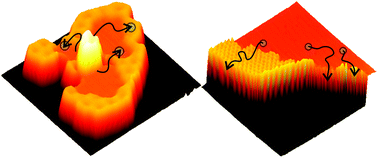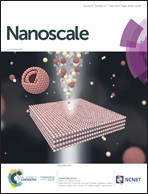Altering the stability of nanoislands through core–shell supports†
Abstract
We follow the decay of two-dimensional Ag nanoclusters, called islands, on Cu–Ag core–shell supports by variable low temperature scanning tunneling microscopy in the temperature range between 160 and 260 K. We reveal two qualitatively different types of decay mechanisms, either linear in time, indicative of an interface-limited decay, or non-linear in time, indicative of diffusion-limited decay. In contrast to conventional decay on monometallic supports, the decay exponent of the diffusion-limited decay depends on temperature; it varies by one order of magnitude. Moreover, the decay rate decreases with increasing temperature. This unusual behaviour is traced back to the temperature-dependent shell of the core–shell support.



 Please wait while we load your content...
Please wait while we load your content...